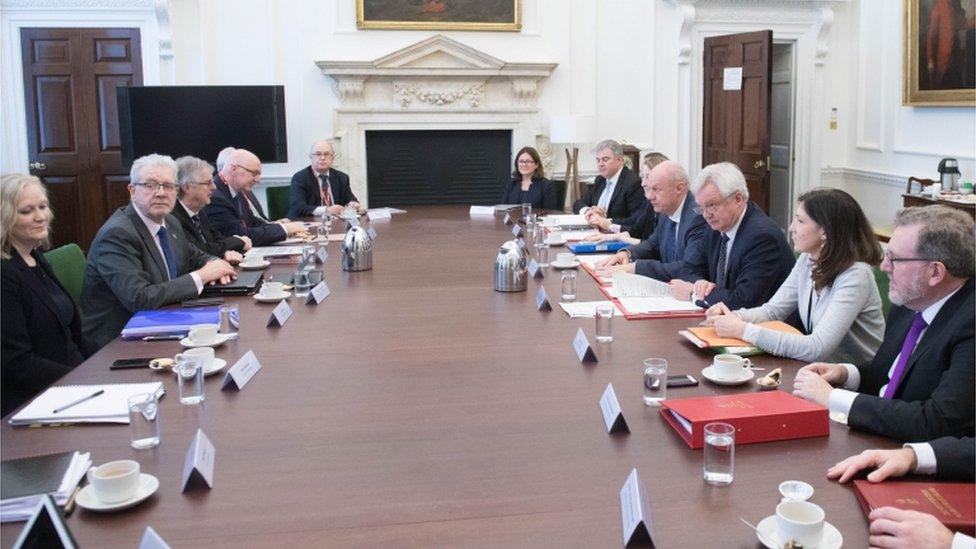MSPs demand changes to EU Withdrawal Bill
- Published
- comments
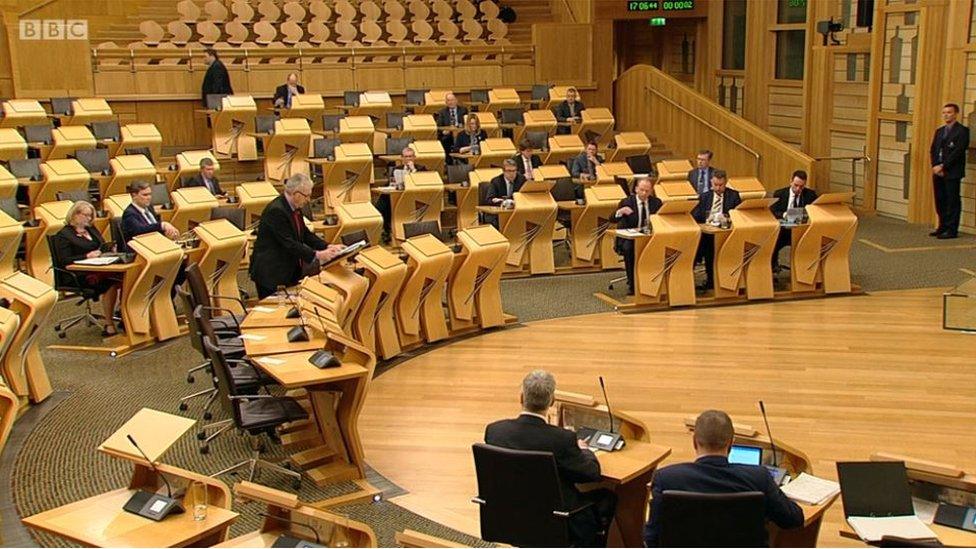
MSPs were unanimous in demanding changes are made to the EU Withdrawal Bill
MSPs from each of Holyrood's parties have demanded changes are made to the EU Withdrawal Bill before it is put to a legislative consent vote.
The bill is at the centre of a dispute between ministers over the distribution of powers which will return from Brussels as the UK leaves the EU.
MSPs backed ministers' refusal to put forward the bill for a Holyrood consent vote unless changes are agreed.
UK ministers say changes will be made to the bill in the House of Lords.
There is cross-party support at Holyrood for changing the bill, with MSPs telling a debate on Tuesday afteroon that it was "incompatible with the devolution settlement".
Scottish and Welsh ministers are working on their own stop-gap legislation should their parliaments ultimately refuse consent, although there have been suggestions that the Lords may refuse to pass the bill without the blessing of the devolved legislatures.
MSPs unanimously endorsed the finance committee's interim report, external, which said consent could not be recommended unless changes are made to the contentious clause of the bill.
The EU Withdrawal Bill, which has now cleared the House of Commons, is a key piece of Brexit legislation which would repeal the 1972 European Communities Act, which took Britain into the EU - but at the same time in effect copy EU laws onto the UK statute book to ensure a smooth transition.
The UK parliament will then be able to "amend, repeal and improve" individual laws as it chooses.
Scottish, Welsh and UK ministers are at loggerheads over laws involved which are not reserved to Westminster - laws which thus technically fall under the competency of the devolved parliaments, but which are currently exercised from Brussels.
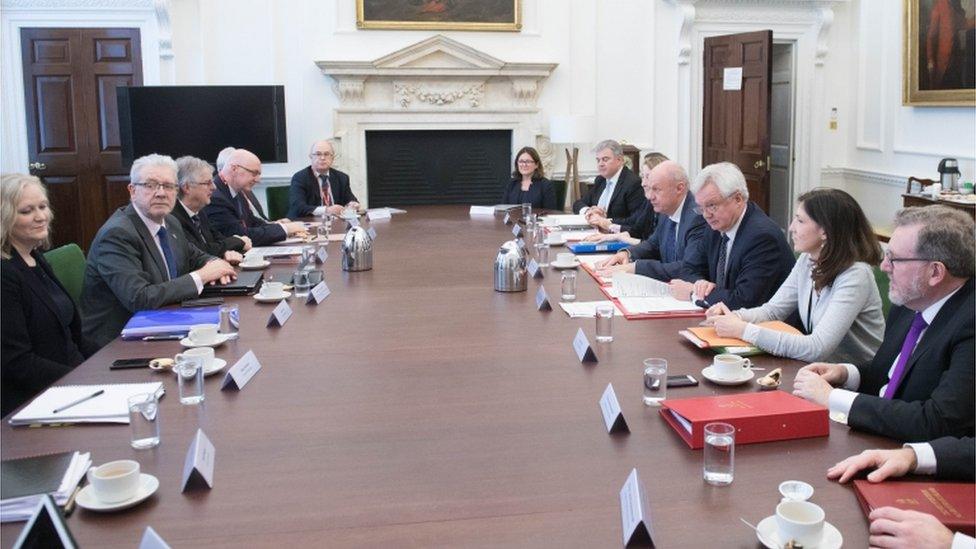
A series of meetings between devolved and UK ministers have failed to settle the Brexit powers row
The current proposals in the bill would see all powers initially return to Westminster, before some are passed on to the devolved legislatures in full and others are incorporated into UK-wide frameworks.
The devolved administrations do not oppose joint frameworks in principle, but have described the plans as they exist in Clause 11 of the Withdrawal Bill as a "naked power grab".
Under pressure from Scottish ministers, SNP MPs and some Scottish Conservative members, Scottish Secretary David Mundell promised that amendments would be made to Clause 11 - but no agreement was struck before the bill completed its passage through the Commons.
The SNP and Labour both criticised Scottish Tory MPs as acting as "lobby fodder" for the government after they refused to back Labour-led amendments to Clause 11 in the final Commons votes.
The UK government insists changes can still be made, but this will now have to happen in the upper chamber. A cross-party group of MSPs has since met peers, MPs and Welsh AMs at the House of Lords for talks on this topic.
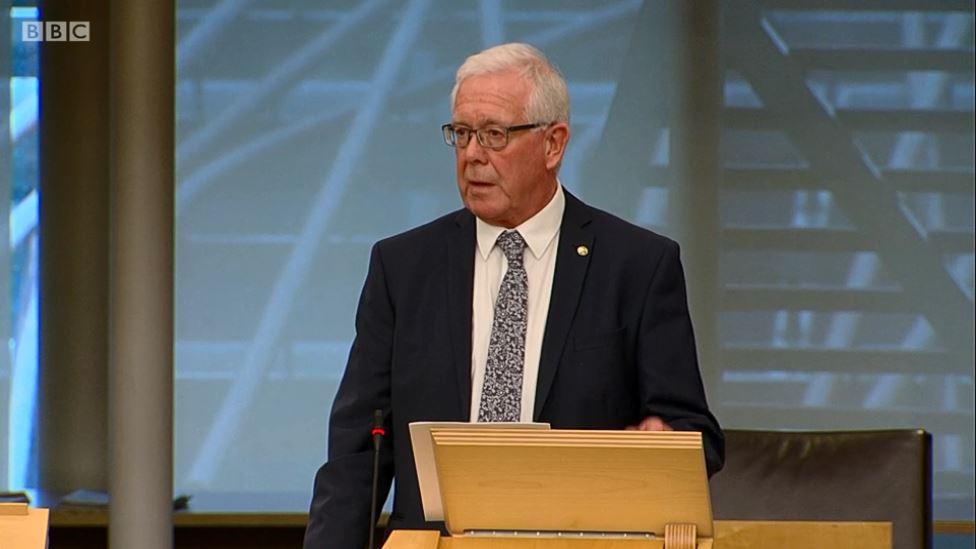
Bruce Crawford voiced "dismay and grave concern" that the bill had not been amended in the Commons
Constitution committee convener Bruce Crawford of the SNP described the bill as "frequently obscure", "Byzantine" and "unnecessarily complex, ambiguous and torturous in both structure and drafting".
He voiced "dismay and grave concern" that amendments had not been brought forward in the Commons, saying it was "imperative" that changes were progressed in the Lords "urgently".
Scottish Conservative MSP Murdo Fraser agreed that clause 11 was "incompatible with the devolution settlement", but said that it was "unlikely to proceed" through the Lords without amendment.
He said "the political will is certainly there" to have the bill changed, something echoed by several of his Tory colleagues - including the constitution committee's deputy convener Adam Tomkins, who said there was "widespread agreement" on many aspects of the deal.
'Abject failure'
However, Scottish Labour's Neil Findlay contended that the Conservatives "couldn't deliver a Friday night takeaway. never mind this important piece of legislation".
He said the lack of amendments in the Commons was an "abject failure of the UK government to deliver on its commitments", accusing Scottish Tory leader Ruth Davidson of having "no influence and no say" over Brexit.
Green co-convener Patrick Harvie said he had "very little expectation" that the EU Withdrawal Bill could be "salvaged in any way that is acceptable", saying: "It shouldn't be dealt with in the House of Lords, it shouldn't be dealt with in the House of Commons, we should reject it here in this parliament."
And Lib Dem leader Willie Rennie warned that "time is running out" to fix the legislation, saying members could end up being "bounced" into accepting amendments without proper scrutiny rather than face the "chaos" of not giving consent.

Scottish Brexit minister Mike Russell echoed the sentiments of many members, and added that the Scottish and Welsh governments were working on the "next option" of their own continuity bills.
He said he hoped an agreement could be found, but said "there is a way forward" if not.
'Highly complicated'
One academic has warned of the difficulties of drafting a continuity bill as a local version of the already "highly complicated and obscure" Withdrawal Bill.
In a guest blog for the Scottish Parliament's information centre, external, Sionaidh Douglas-Scott, a law professor at the University of London, said "timing is tight" for what could prove an extremely complex piece of legislation.
She also said the continuity bill "might well face a legal challenge" in the Supreme Court, and noted that due to a previous court ruling on Brexit legislation the UK government could technically press ahead and legislate for the whole of the UK regardless.
Justices unanimously ruled in the Article 50 case that the convention of devolved consent was a political one, and not enforceable in court - although Prof Douglas-Scott said it would be a "grave matter politically to ignore a constitutional convention, and so act unconstitutionally".
She added that "the greatest value of a continuity bill may be the political pressure it might exert on the UK government to amend Clause 11".
- Published18 January 2018

- Published17 January 2018
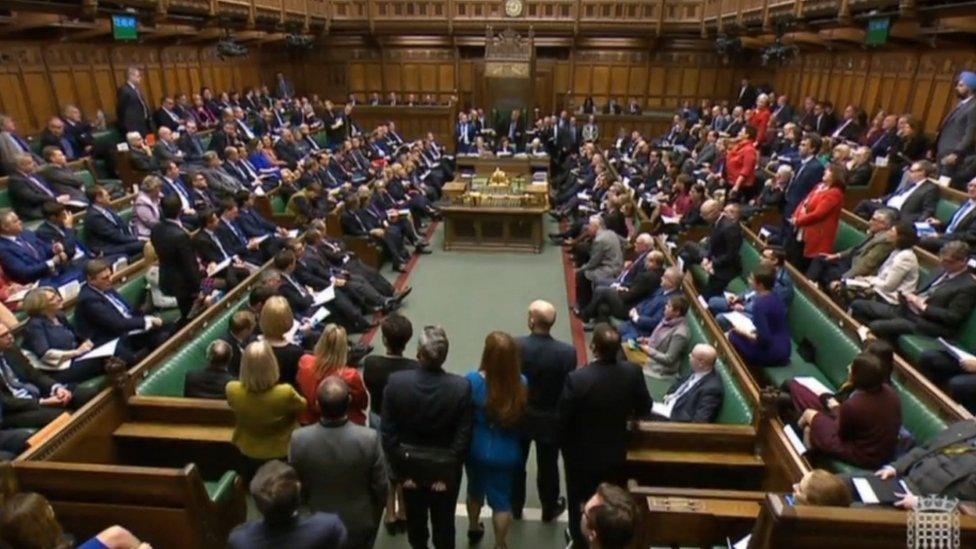
- Published9 January 2018

- Published12 December 2017
